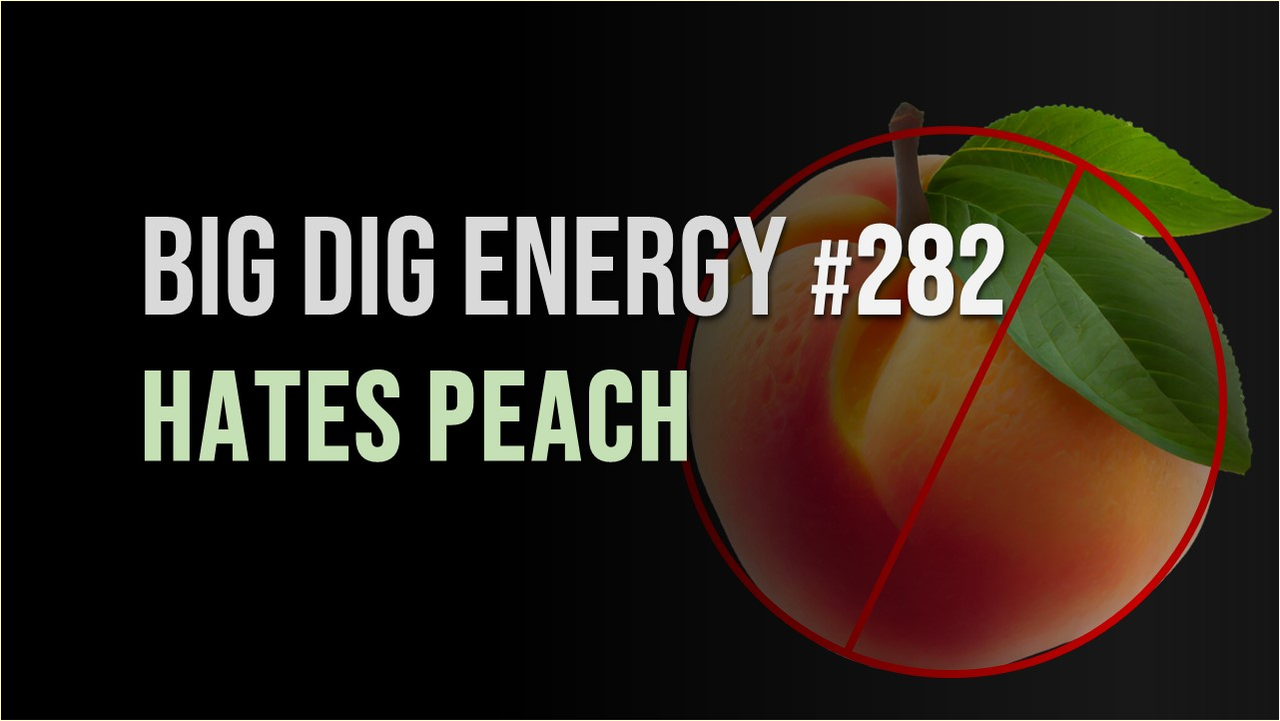| Previous Episode | Next Episode |
|:---: |:---: |
| [[BDE281]] | [[BDE283]] |

%%Post image thumbnail below.%%
> [!info|flex bg-c-gray] Episode Overview
>
> - **Date Aired:** [[01-23-2024]]
> - **Title:** Hates Peach
> - **Episode:** 282
> - **Description:**
> - **Link:** <https://rumble.com/v48vm1i-big-dig-energy-282-hates-peach.html>
%%<https://historydraft.com/happened/what-happened/1-January/world>%%
## Replay
%% Get embed URL then highlight and hit ALT + I%%
<iframe src="https://rumble.com/embed/v46aamc/?pub=6eeyh" allow="fullscreen" allowfullscreen="" style="height:100%;width:100%; aspect-ratio: 16 / 9; "></iframe>
<br>
## Segments
### Hate Speech
#### EU Votes to Make Hate Speech an EU Crime
[“You’re Big Brother:” EU Parliament Votes To Make Hate Speech an EU Crime ━ The European Conservative](https://europeanconservative.com/articles/news/youre-big-brother-eu-parliament-votes-to-make-hate-speech-an-eu-crime/)
> Sparking intense criticism from conservatives, the left-leaning majority of the European Parliament adopted a resolution calling for the extension of the EU crime list to include hate speech and hate crimes, which would allow the European Commission to introduce binding minimum penalties for all member states.
>
> The vote, that took place on Thursday, January 18th, passed with 397 for and 121 against, with only 26 abstentions—the latter mainly coming from a handful of dissident leftists concerned that the law may be used to silence anti-Israel voices. As always, only the two conservative blocs, ECR and ID, voted against it while all leftist parties and the center-right EPP supported the report.
[EU Votes on Resolution To List "Hate Speech" as a Crime](https://reclaimthenet.org/eu-votes-on-resolution-to-list-hate-speech-as-a-crime)
As part of the growing support for censorship within the EU, the EU Parliament has cast their votes for a resolution, regarding making so-called “hate speech” a crime throughout the Union.
[REPORT on extending the list of EU crimes to hate speech and hate crime](https://www.europarl.europa.eu/doceo/document/A-9-2023-0377_EN.html)
#### Linda Yaccarino Blog Post on Hate Speech
[X CEO Linda Yaccarino Says “Free Speech” Ends at “Hate Speech”](https://reclaimthenet.org/x-ceo-linda-yaccarino-says-free-speech-ends-at-hate-speech)
A new blog post penned this week by X Corp CEO Linda Yaccarino goes into this, at once claiming that society must “empower people to express its thoughts” – but also, that the line must be drawn at “hate” and “hate speech.”
[Safeguarding Information Independence and Combating Hate Speech](https://blog.twitter.com/en_us/topics/company/2023/safeguarding-information-independence-and-combating-hate-speech)
Faced with the option of a future dependent on gatekeepers and moderators that restrict the free flow of information or a world where information flows freely – I choose information independence. Here’s why.
As someone whose career was built around entertainment and news organizations I know the impact information can have on communities and culture. Joining X has been liberating, because it’s a place for everyone to freely be themselves. That freedom and society’s progress requires information independence: the free exchange of ideas, information and knowledge through freedom of speech. To drive humanity forward, society must empower people to express their thoughts, make up their own minds, but also draw the line at hate. This is tough to do, but absolutely crucial.
Some people believe they have complete information independence. They don’t – information independence is under threat. Heavy content filtering practices of some platforms and media entities have altered people’s understanding of the truth. And we’re seeing things we held as true being openly challenged. Control, censorship, and information centralization holds us back – while greater access to information propels us forward and fuels positive change.
**Media Entities:**

### Behavioral Interventions to Reduce Vaccine Hesitancy
The BMJ published a new paper in their [series examining](https://www.bmj.com/social-media-influencing-vaccination) the influence of social media on the likelihood of someone to get vaccinated. This new paper (doi: https://doi.org/10.1136/bmj-2023-076542) was published on January 16, 2024. Most notably, this paper does not begin and end with making sound medical arguments, but instead links hesitancy and refusal to social media driven misinformation and disinformation.

> [!info|no-icon flex bg-c-gray]- Behavioral interventions to reduce vaccine hesitancy driven by misinformation on social media ([[01-16-2024]])<br> <sub>**Click to Expand ➜**</sub>
> \- **[Archived URL](https://web.archive.org/web/20240123044309/https://www.bmj.com/content/384/bmj-2023-076542)**
>
> <div style="left: 0; width: 100%; height: 0; position: relative; padding-bottom: 60%;"><iframe src="https://docs.google.com/viewer?embedded=true&url=https://ia601304.us.archive.org/15/items/bmj-2023-076542.full/bmj-2023-076542.full.pdf" style="top: 0; left: 0; width: 100%; height: 100%; position: absolute; border: 0;" allowfullscreen></iframe></div>
<br>
> [!quote|mark no-t]
> <p style="font-size:125%"><font color="#ffffff"> Vaccine misinformation on social media has strong effects on behaviour, and the evidence base for interventions to reduce these effects is limited, but better approaches to evidence generation are possible, say Kai Ruggeri and colleagues. </font></p>
**Authors:**
- **Kai Ruggeri** — Department of Health Policy and Management, Mailman School of Public Health, [[Columbia University]], New York City, NY, USA
- **Samantha Vanderslott** — Vaccines and Society Unit, Oxford Vaccine Group, Centre for Clinical Vaccinology and Tropical Medicine, Churchill Hospital, NIHR Oxford Biomedical Research Centre, Oxford, UK
- **Yuki Yamada** — Faculty of Arts and Science, Kyushu University, Fukuoka, Japan
- **Young Anna Argyris** — Department of Media and Information, Michigan State University, East Lansing, MI, USA
- **Bojana Većkalov** — Department of Psychology, University of Amsterdam, Amsterdam, Netherlands
- **Paulo Sergio Boggio** — Cognitive and Social Neuroscience Laboratory, Mackenzie Presbyterian University, São Paulo, Brazil
- **Mosoka P Fallah** — Saving Lives and Livelihoods, Africa Center for Disease Control, Addis Ababa, Ethiopia
- **Friederike Stock** — Center for Adaptive Rationality, Max Planck Institute for Human Development, Berlin, Germany
- **Ralph Hertwig** — Max Planck Institute for Human Development, Berlin, Germany
**Key Highlights:**
- "Standard behavioral approaches to encourage vaccination include **mandatory vaccination and regulation for healthcare professionals**, incentives, public health communication campaigns, and engaging trusted leaders."

- "Critical aspects of studies that are necessary to better understand and compare possible interventions that tackle vaccine hesitancy on social media (described in box 2). The examples of what specifically to measure and observe are non-exhaustive. All aspects should be included for maximum value, though **behavioral and population health outcomes should be prioritized**. Boxes with thick outlines and darker shading are considered absolutely necessary, though all boxes are strongly recommended."

**Developing better interventions to confront vaccine hesitancy on social media**
"Few interventions among those we evaluated captured evidence about real world behaviors, so there is currently no gold standard toolkit that public health agencies can refer to. But the evidence available can inform future tool development. We provide 10 insights based on the existing evidence that should help provide a clearer and more specific, evidence driven toolkit of approaches to reduce vaccine hesitancy."
[Link](https://www.bmj.com/content/384/bmj-2023-076542#:~:text=Developing%20better%20interventions%20to%20confront%20vaccine%20hesitancy%20on%20social%20media)
1. Negative sentiments on social media might increase vaccine hesitancy faster than interventions reduce it.
2. Messaging seems to work best when it is tailored to what groups know and care about.
3. Simple messaging about benefits and risk based on probabilities is not enough.
4. Correct misinformation to both parents and their children—Parents, especially mothers, play a major part in child vaccination.
5. Trust matters: the message, the messenger, and the (vaccinated) provider.
6. Debunking efforts have shown mixed effects on social media.
7. Raising the quality and visibility of reliable health information can counter misinformation.
8. Framing of vaccine messages matters.
9. ==Blanket bans can drive groups and activities underground==.
10. Social media platforms need to be part of the solution
**Footnotes:**
"The article is part of a collection that was proposed by the Advancing Health Online Initiative (AHO), a consortium of partners including Meta and MSD, and several non-profit collaborators (https://www.bmj.com/social-media-influencing-vaccination). Research articles were submitted following invitations by The BMJ and associated BMJ journals, after consideration by an internal BMJ committee. Non-research articles were independently commissioned by The BMJ with advice from Sander van der Linden, Alison Buttenheim, Briony Swire-Thompson, and Charles Shey Wiysonge. Peer review, editing, and decisions to publish articles were carried out by the respective BMJ journals. Emma Veitch was the editor for this collection."

> Social media platforms are transforming communication and the ways in which people access information about health. Despite the many benefits of these tools, concerns exist around the capacity for social media to enable proliferation of misinformation or scientifically invalid ideas, particularly around vaccination. How can we draw insights from research conducted using social media to understand its effects on beliefs and behaviours around vaccination, and to influence population health outcomes?
>
> In collaboration with the [Advancing Health Online Initiative](http://aaho.org/) (AHO), this collection brings together original research examining the diverse relationships between social media use and vaccination beliefs and behaviours globally. The research studies included in this collection were funded through AHO’s [Vaccine Confidence Fund](https://vaccineconfidencefund.org/). Further Analysis and Opinion articles, commissioned by _The BMJ_, explore the challenges of carrying out research in this nascent field and in drawing insights for policy action.
#### Advancing Health Online Initiative
> AHO is an initiative launched by Meta and MSD in June 2021, and is a fiscally sponsored project of Global Impact. The [Vaccine Confidence Fund](https://vaccineconfidencefund.org/) is managed by Global Impact for AHO and is financially supported by Meta and MSD. Meta and MSD did not participate in the selection of Vaccine Confidence Fund grant recipients, nor the selection of the articles for inclusion in the collection. Funding for the collection was provided by Meta through Global Impact.
**[Global Impact:](https://projects.propublica.org/nonprofits/organizations/521273585)**

The AAHO (Alliance for Advancing Health Online) brings together the Bay Area Global Health Alliance, the CDC Foundation, Facebook, the MIT Initiative on the Digital Economy, Merck & Co., Inc., Sabin Vaccine Institute, the Vaccine Confidence Project at the London School of Hygiene & Tropical Medicine, the [[World Bank]], the World Health Organization, and Global Impact.
**List of Collaborators:**
- [Bay Area Global Health Alliance](https://bayareaglobalhealth.org/alliance-for-advancing-health-online)
- [CDC Foundation](https://www.cdcfoundation.org/) - [Form 990s](https://projects.propublica.org/nonprofits/organizations/582106707)
- [MIT Initiative on the Digital Economy](https://ide.mit.edu/)
- [Merck](https://www.msd.com/)
- [Meta](https://www.meta.com/)
- [Sabin Vaccine Institute](https://www.sabin.org/) - [Form 990s](https://projects.propublica.org/nonprofits/organizations/61389829)
- [The Vaccine Confidence Project](https://www.vaccineconfidence.org/)
- [World Bank Group](https://www.worldbank.org/en/home)
- [[World Health Organization]]
- [Global Impact](https://charity.org/) - [Form 990s](https://projects.propublica.org/nonprofits/organizations/521273585) - Global Impact’s reach and services are complemented by the work of its subsidiary company, [Geneva Global](https://www.genevaglobal.com/).

[Global Impact, on Behalf of the Advancing Health Online Initiative (AHO), Announces Collaboration with Gavi, the Vaccine Alliance at the Concordia Annual Summit](https://www.ahoinitiative.org/global-impact-on-behalf-of-the-advancing-health-online-initiative-aho-announces-collaboration-with-gavi-the-vaccine-alliance-at-the-concordia-annual-summit/)
> Alongside the 78th United Nations General Assembly, Global Impact as fiscal sponsor for the Advancing Health Online Initiative (AHO), announced an innovative collaboration with Gavi, the Vaccine Alliance, centered around **VaxSocial, an initiative supporting country-driven projects that leverage social media and behavioral science to build confidence around routine immunizations.**

%% FOOTER %%
---

---
## Keep Digging
%%Space%%
### Tags
#Stream/BDE
### Footnotes & References